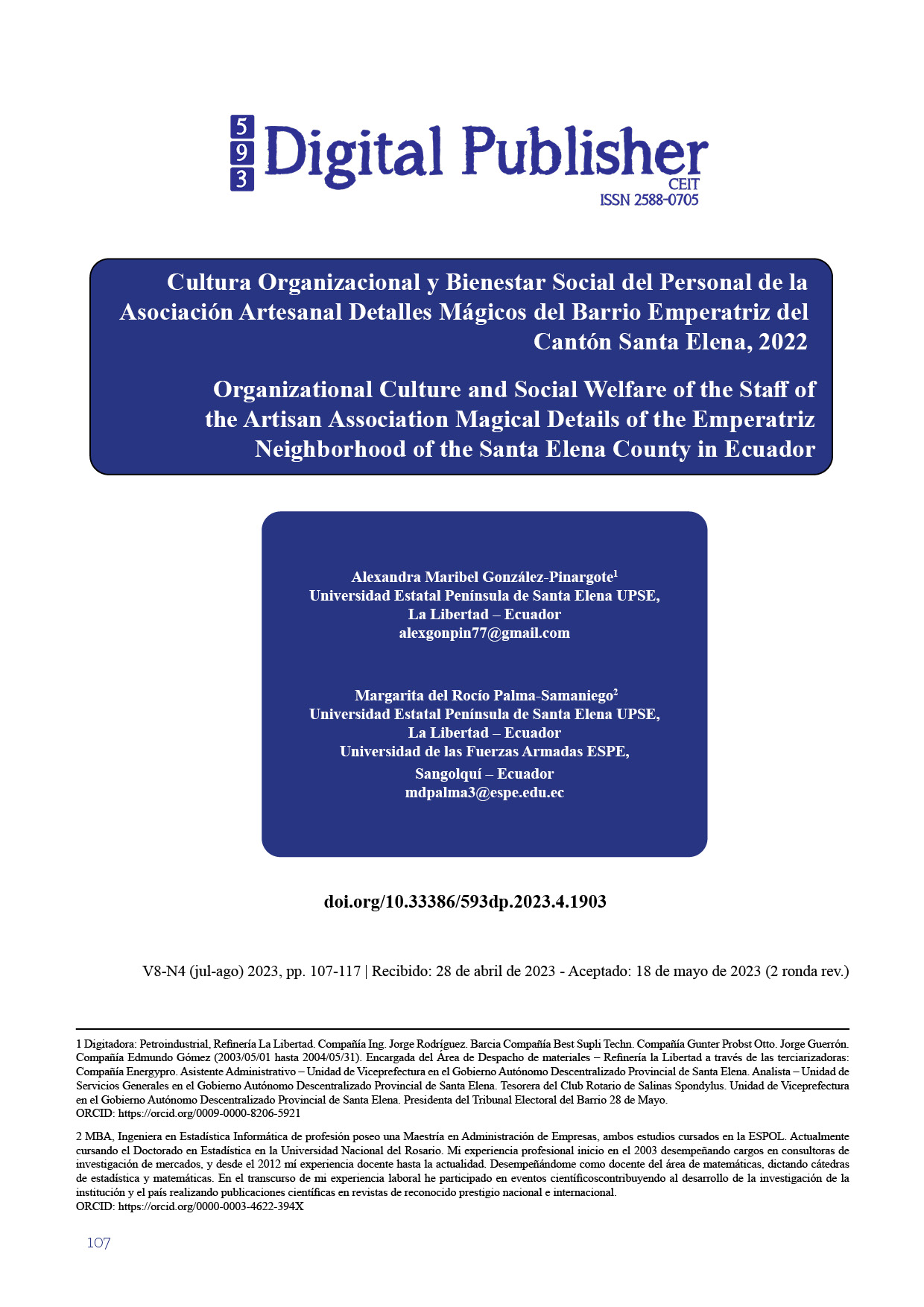Organizational Culture and Social Welfare of the Staff of the Artisan Association Magical Details of the Emperatriz Neighborhood of the Santa Elena County in Ecuador
Main Article Content
Abstract
Organizational culture and employee social welfare are fundamental aspects to achieve a healthy and productive organization in the Handicraft Association Detalles Mágicos of the Emperatriz Neighborhood of Santa Elena Canton. The purpose of the study was to determine the link between organizational culture and social welfare, for the design of a management model that benefits the personnel of the Handicraft Association Detalles Mágicos of the Emperatriz Neighborhood of Santa Elena Canton, 2022. The results presented so far suggest that a significant minority of employees experience low social welfare, indicating an urgent need to improve the working and social conditions of the organization. It is important to promote an organizational culture focused on the mental health and emotional well-being of employees, which can significantly improve employee social welfare. Improving organizational culture and employee social welfare is essential to increase job satisfaction, motivation, and productivity, which in turn can lead to better outcomes for the organization. In conclusion, the association should pay attention to both quantitative and qualitative aspects of employee social welfare and involve employees in the process of improving organizational culture and social welfare.
Downloads
Article Details

This work is licensed under a Creative Commons Attribution-NonCommercial-ShareAlike 4.0 International License.
1. Derechos de autor
Las obras que se publican en 593 Digital Publisher CEIT están sujetas a los siguientes términos:
1.1. 593 Digital Publisher CEIT, conserva los derechos patrimoniales (copyright) de las obras publicadas, favorece y permite la reutilización de las mismas bajo la licencia Licencia Creative Commons 4.0 de Reconocimiento-NoComercial-CompartirIgual 4.0, por lo cual se pueden copiar, usar, difundir, transmitir y exponer públicamente, siempre que:
1.1.a. Se cite la autoría y fuente original de su publicación (revista, editorial, URL).
1.1.b. No se usen para fines comerciales u onerosos.
1.1.c. Se mencione la existencia y especificaciones de esta licencia de uso.
References
Albalá, Guido, y Biglieri. (2019). Ciudadanía, participación sociopolítica y bienestar social: Funadamentos teóricos. Anuario de investigaciones, 37(2), 99 -109. https://www.redalyc.org/
Alonso, Salinas, Gutiérrez, González, Pinzón, Jiménez, Gálvez, Martínez, y Salvador. (2020). Evaluación del impacto de un plan multisectorial de promoción de salud y bienestar social en Andalucía. Gaceta Sanitaria, 34(6), 615-623. https://doi.org/https://doi.org/10.1016/j.gaceta.2019.01.001
Castañeda, y Dávila. (2021). Haciendo camino al andar: características de los líderes y lideresas comunitarias en el sur de Córdoba y Urabá - Darién. Caso CORDUPAZ Colombia. El ágora USB, 21(2), 502 - 519. https://doi.org/10.21500/16578031.5126
Dawadi, Shrestha, y Giri. (2021). Mixed-Methods Research: A Discussion on its Types, Challenges, and Criticisms . Journal of Practical Studies in Education, 25-37. https://bit.ly/3pCYqJQ
De Araujo. (2020). Cultura organizacional e innovación: una revisión de la literatura. Tesis de Mestría. EAFIT. Repositorio Universidad EAFIT. https://repository.eafit.edu.co/bitstream/handle/10784/16043/Natalia_DeAraujoUribe_2020.pdf?sequence=2
Díaz, P. (2020). La triple dimensión de la cultura organizacional: un estudio aplicado a empresa de moda españolas. Revista Prisma Social, 2(29), 80 - 97. https://revistaprismasocial.es/article/view/3617/4186
EBS . (2021). Marco teórico de la Encuesta de Bienestar Social. Observatorio Social de Chile. http://observatorio.ministeriodesarrollosocial.gob.cl/storage/docs/bienestar-social/EBS_2021_Marco_teorico.pdf
Feria, Matilla, y Mantecón. (2020). La entrevista y la encuesta. Métodos o técnicas de indagación empírica? Revista didáctica y educación, 1(1), 1-18. https://dialnet.unirioja.es/descarga/articulo/7692391.pdf
Fernández , R., Martínez, R., Palmero, D., Gálvez, S., & Álvarez, M. (2019). Validación de instrumentos como garantía de la credibilidad en las investigaciones científicas. Revista Cubana de Medicina Militar, 48(2), 441 - 450. https://doi.org/S/D
Gozález, R., y Flores, K. (2020). Cultura organizacional y sustenabilidad empresarial en las Pymes durante crisis periodo de confinamiento social. Revista Internacional Multidisciplinaria, 1(1), 28-41. https://dialnet.unirioja.es/servlet/articulo?codigo=8432629
Gutierrez. (2018). Instalación del sistema de saneamiento básico y su influencia en el bienestar social de la población en la zona rural de Llapa - distrito de Llapa - San Miguel - Cajamarca, 2018. Tesis de Maestria UCV. Universidad César Vallejo. https://repositorio.ucv.edu.pe/bitstream/handle/20.500.12692/30203/Gutierrez_MJS.pdf?sequence=1&isAllowed=y
Irgil, Kreft, Lee, Willis, y Zvobgo. (2021). Field Research: A Graduate Student´s Guide. International Studies Review, 1495-1517. https://doi.org/10.1093/isr/viab023
Keyes. (1998). Social Well-Being. Social Psycology Quarterly, 61(2), 121-14. https://doi.org/https://doi.org/10.2307/2787065
Mendez, C. (2019). Elementos para la relación entre cultura orgnizacional y estrategia. Universidad y Empresa, 21(37), 136 - 169. https://doi.org/http://dx.doi.org/10.12804/revistas.urosario.edu.co/empresa/a.7681
MIDE. (2020). Desarrollo de Instrumentos de evaluación: cuestionarios. Cuadernillo técnico de evaluación educativa. Santiago: Centro de Medición MIDE UC. https://www.inee.edu.mx/wp-content/uploads/2019/08/P2A355.pdf
Ouchi. (1982). Teoría Z. México: Fondo Educativo Interamericano. https://www.casadellibro.com/libro-teoria-z/mkt0005893654/11604995
Pazos, W. (2020). La identidad corporativa en las organizaciones, Lima. Tesis USMP. Repositorio Universidad San Martín de Porres. https://repositorio.usmp.edu.pe/bitstream/handle/20.500.12727/7581/PAZOS_FW.pdf?sequence=1&isAllowed=y
Petrilli, Juárez, y Herrera. (2022). Cultura organizacional pra el desarrollo social sostenible en microempresas. Diseño de un instrumento para su evaluación. Revista Iberoamericana de Estudios de Desarrollo , 11(1), 110-129. https://doi.org/10.26754/ojs_ried/ijds.659
Posso. (2019). El valor de la solidaridad en los currículos de comunicación de la Universidad Cooperativa de Colombia. Revista Educación , 43(1), 1-16. https://doi.org/https://doi.org/10.15517/revedu.v43i1.28910
Reyes, y Moros. (2019). La cultura organizacional: principales desafíos teóricos y metodológicos para su estudio. Estudios del Desarrollo Social, 7(1), versión online. http://scielo.sld.cu/scielo.php?script=sci_arttext&pid=S2308-01322019000100201
Reyes, y Moros. (2019). La cultura organizacional: principales desafíos teóricos y metodológicos para su estudio. Revista Estudios del Desarrollo Social: Cuba y América Latina, 7(1), 201-218. http://scielo.sld.cu/scielo.php?script=sci_arttext&pid=S2308-01322019000100201
Rincón, y Aldana. (2021). Cultura organizacional y su relación con los sistemas de gestión: una revisión bibliográfica. SIGNOS-Investigación en Sistemas de Gestión, 13(2), 1-27. https://doi.org/https://doi.org/10.15332/24631140.6675
Salazar, Guerrero, Machado, y Cañedo. (2019). Clima y cultura organizacional: doscomponentes esenciales en la productividad laboral. ACIMED, 20(4), 115-125. http://scielo.sld.cu/scielo.php?scrip
Segredo, García, León, y Perdomo. (2019). Desarrollo organizacional, cultura organizacional y clima organizacional. Una aproximación conceptual. Infodir. Información para directivos de la Salud., 1(24), 86-99. https://revinfodir.sld.cu/index.php/infodir/article/view/200/476
Wani. (2018). Population and Sample. M.A. Edu/Research Methodology/Sampling. https://bit.ly/3mJO8qx



